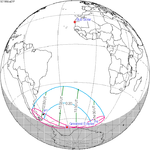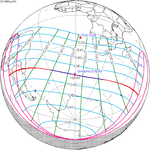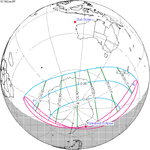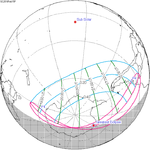Solar eclipse of December 12, 1909
A partial solar eclipse occurred on December 12, 1909.[1][2] A solar eclipse occurs when the Moon passes between Earth and the Sun, thereby totally or partly obscuring the image of the Sun for a viewer on Earth. A partial solar eclipse occurs in the polar regions of the Earth when the center of the Moon's shadow misses the Earth. This event was visible as a partial solar eclipse across 24-hour daylight Antarctica.
Related eclipses
Solar eclipses 1906–1909
This eclipse is a member of a semester series. An eclipse in a semester series of solar eclipses repeats approximately every 177 days and 4 hours (a semester) at alternating nodes of the Moon's orbit.[3]
| Solar eclipse series sets from 1906 to 1909 | ||||
|---|---|---|---|---|
| Ascending node | Descending node | |||
| 115 | July 21, 1906 Partial | 120 | January 14, 1907 Total | |
| 125 | July 10, 1907 Annular | 130 | January 3, 1908 Total | |
| 135 | June 28, 1908 Annular | 140 | December 23, 1908 Hybrid | |
| 145 | June 17, 1909 Hybrid | 150 | December 12, 1909 Partial | |
Saros 150
It is a part of Saros cycle 150, repeating every 18 years, 11 days, containing 71 events. The series started with partial solar eclipse on August 24, 1729. It contains annular eclipses from April 22, 2126, through June 22, 2829. There are no total eclipses in this series. The series ends at member 71 as a partial eclipse on September 29, 2991. The longest duration of annularity will be 9 minutes, 58 seconds on December 19, 2522.
| Series members 11-21 occur between 1901 and 2100: | ||
|---|---|---|
| 11 | 12 | 13 |
 December 12, 1909 |  December 24, 1927 |  January 3, 1946 |
| 14 | 15 | 16 |
 January 14, 1964 |  January 25, 1982 |  February 5, 2000 |
| 17 | 18 | 19 |
 February 15, 2018 |  February 27, 2036 |  March 9, 2054 |
| 20 | 21 | |
 March 19, 2072 |  March 31, 2090 | |
References
- ^ "Partial eclipse of the sun". Columbia Missourian. Columbia, Missouri. 1909-12-13. p. 1. Retrieved 2023-11-01 – via Newspapers.com.
- ^ "Eclipse of the Sun". Whittier Daily News. Whittier, California. 1909-12-13. p. 2. Retrieved 2023-11-01 – via Newspapers.com.
- ^ van Gent, R.H. "Solar- and Lunar-Eclipse Predictions from Antiquity to the Present". A Catalogue of Eclipse Cycles. Utrecht University. Retrieved 6 October 2018.
External links
- Earth visibility chart and eclipse statistics Eclipse Predictions by Fred Espenak, NASA/GSFC
- Besselian elements
- v
- t
- e
| By era | |
|---|---|
| Saros series (list) | |
| Visibility | |
| Historical |
|

Total/hybrid eclipses
→ next total/hybrid
- 1133
- 1185
- 1560
- 1598
- 1652
- 1654
- 1673
- 1706
- 1715
- 1724
- 1766
- 1778
- 1780
- 1806
- 1816
- 1824
- 1842
- 1851
- 1853
- 1857
- 1858
- 1860
- 1865
- 1867
- 1868
- 1869
- 1870
- 1871
- 1874
- 1875
- 1878
- 1882
- 1883
- 1885
- 1886
- 1887
- Jan. 1889
- Dec. 1889
- 1893
- 1896
- 1898
- 1900
- 1901
- 1903
- 1904
- 1905
- 1907
- Jan. 1908
- Dec. 1908
- 1909
- 1910
- 1911
- Apr. 1912
- Oct. 1912
- 1914
- 1916
- 1918
- 1919
- 1921
- 1922
- 1923
- 1925
- 1926
- 1927
- 1928
- 1929
- Apr. 1930
- Oct. 1930
- 1932
- 1934
- 1936
- 1937
- 1938
- 1939
- 1940
- 1941
- 1943
- Jan. 1944
- 1945
- 1947
- 1948
- 1950
- 1952
- 1954
- 1955
- 1956
- 1957
- 1958
- 1959
- 1961
- 1962
- 1963
- 1965
- 1966
- 1967
- 1968
- 1970
- 1972
- 1973
- 1974
- 1976
- 1977
- 1979
- 1980
- 1981
- 1983
- 1984
- 1985
- 1986
- 1987
- 1988
- 1990
- 1991
- 1992
- 1994
- 1995
- 1997
- 1998
- 1999
- 2001
- 2002
- 2003
- 2005
- 2006
- 2008
- 2009
- 2010
- 2012
- 2013
- 2015
- 2016
- 2017
- 2019
- 2020
- 2021
- 2023
- 2024
- → 2026
- 2027
- 2028
- 2030
- 2031
- 2033
- 2034
- 2035
- 2037
- 2038
- 2039
- 2041
- 2042
- 2043
- 2044
- 2045
- 2046
- 2048
- 2049
- 2050
- 2052
- 2053
- 2055
- Jan. 2057
- Dec. 2057
- 2059
- 2060
- 2061
- 2063
- 2064
- 2066
- 2067
- 2068
- 2070
- 2071
- 2072
- 2073
- 2075
- 2076
- 2077
- 2078
- 2079
- 2081
- 2082
- 2084
- 2086
- 2088
- 2089
- 2090
- 2091
- 2093
- 2094
- 2095
- 2096
- 2097
- 2099
- 2100
- 2186

Annular eclipses
→ next annular
- 1820
- 1854
- 1879
- 1889
- 1900
- 1901
- 1903
- 1904
- 1905
- 1907
- 1908
- 1911
- 1914
- Feb. 1915
- Aug. 1915
- 1916
- 1917
- 1918
- 1919
- 1921
- 1922
- 1923
- 1925
- 1926
- 1927
- 1929
- 1932
- Feb. 1933
- Aug. 1933
- 1934
- 1935
- 1936
- 1937
- 1939
- 1940
- 1941
- 1943
- Jul. 1944
- 1945
- 1947
- 1948
- 1950
- Mar. 1951
- Sep. 1951
- 1952
- Jan. 1954
- Dec. 1954
- 1955
- 1957
- 1958
- 1959
- 1961
- 1962
- 1963
- 1965
- 1966
- Mar. 1969
- Sep. 1969
- 1970
- 1972
- Jan. 1973
- Dec. 1973
- 1976
- 1977
- 1979
- 1980
- 1981
- 1983
- 1984
- 1987
- 1988
- 1990
- 1991
- 1992
- 1994
- 1995
- 1998
- 1999
- 2001
- 2002
- 2003
- 2005
- 2006
- 2008
- 2009
- 2010
- 2012
- 2013
- 2014
- 2016
- 2017
- 2019
- 2020
- 2021
- 2023
- → 2024
- 2026
- 2027
- 2028
- 2030
- 2031
- 2032
- 2034
- 2035
- 2036
- Jan. 2038
- Jul. 2038
- 2039
- 2041
- 2042
- 2043
- 2044
- 2045
- 2046
- 2048
- 2049
- 2052
- 2053
- Jan. 2056
- Jul. 2056
- 2057
- 2059
- 2060
- 2061
- 2063
- 2064
- 2066
- 2067
- 2070
- 2071
- Jan. 2074
- Jul. 2074
- 2075
- 2077
- 2078
- 2079
- 2081
- 2082
- 2084
- Jun. 2085
- Dec. 2085
- 2088
- 2089
- Feb. 2092
- Aug. 2092
- 2093
- 2095
- 2096
- 2097
- 2099
- 2100

Partial eclipses
→ next partial
- Jan. 1639
- Apr. 1902
- May 1902
- Oct. 1902
- Feb. 1906
- Jul. 1906
- Aug. 1906
- Dec. 1909
- Nov. 1910
- Apr. 1913
- Aug. 1913
- Sep. 1913
- Dec. 1916
- Jan. 1917
- Jun. 1917
- Jul. 1917
- May 1920
- Nov. 1920
- Mar. 1924
- Jul. 1924
- Aug. 1924
- Dec. 1927
- Jun. 1928
- Nov. 1928
- Apr. 1931
- Sep. 1931
- Oct. 1931
- Jan. 1935
- Feb. 1935
- Jun. 1935
- Jul. 1935
- Nov. 1938
- Mar. 1942
- Aug. 1942
- Sep. 1942
- Jan. 1946
- May 1946
- Jun. 1946
- Nov. 1946
- Apr. 1949
- Oct. 1949
- Feb. 1953
- Jul. 1953
- Aug. 1953
- Dec. 1956
- Mar. 1960
- Sep. 1960
- Jan. 1964
- Jun. 1964
- Jul. 1964
- Dec. 1964
- May 1967
- Mar. 1968
- Feb. 1971
- Jul. 1971
- Aug. 1971
- Dec. 1974
- May 1975
- Nov. 1975
- Apr. 1978
- Oct. 1978
- Jan. 1982
- Jun. 1982
- Jul. 1982
- Dec. 1982
- May 1985
- Apr. 1986
- Mar. 1989
- Aug. 1989
- Dec. 1992
- May 1993
- Nov. 1993
- Apr. 1996
- Oct. 1996
- Sep. 1997
- Feb. 2000
- 1 Jul. 2000
- 31 Jul. 2000
- Dec. 2000
- Apr. 2004
- Oct. 2004
- Mar. 2007
- Sep. 2007
- Jan. 2011
- Jun. 2011
- Jul. 2011
- Nov. 2011
- Oct. 2014
- Sep. 2015
- Feb. 2018
- Jul. 2018
- Aug. 2018
- Jan. 2019
- Apr. 2022
- Oct. 2022
- → Mar. 2025
- Sep. 2025
- Jan. 2029
- Jun. 2029
- Jul. 2029
- Dec. 2029
- 2032
- 2033
- Feb. 2036
- Jul. 2036
- Aug. 2036
- 2037
- May 2040
- Nov. 2040
- Jan. 2047
- Jun. 2047
- Jul. 2047
- Dec. 2047
- 2050
- Apr. 2051
- Oct. 2051
- Mar. 2054
- Aug. 2054
- Sep. 2054
- 2055
- May 2058
- Jun. 2058
- Nov. 2058
- Mar. 2062
- Sep. 2062
- Feb. 2065
- Jul. 2065
- Aug. 2065
- Dec. 2065
- 2068
- Apr. 2069
- May 2069
- Oct. 2069
- 2072
- 2073
- Jun. 2076
- Jul. 2076
- Nov. 2076
- Feb. 2083
- Jul. 2083
- Aug. 2083
- 2084
- 2086
- May 2087
- Jun. 2087
- Oct. 2087
- 2090
- 2091
- Jun. 2094
- Jul. 2094
- Dec. 2094
- Apr. 2098
- Sep. 2098
- Oct. 2098
 Astronomy portal
Astronomy portal Solar System portal
Solar System portal Category
Category
 | This solar eclipse–related article is a stub. You can help Wikipedia by expanding it. |
- v
- t
- e














